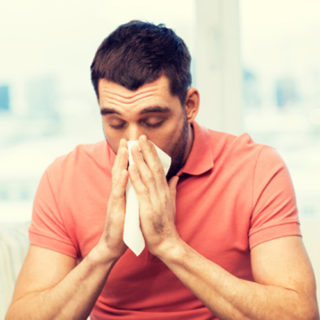 Serving Patients in the areas of Grand Rapids, Holland, and Big Rapids MI
Serving Patients in the areas of Grand Rapids, Holland, and Big Rapids MI
Warm weather is here, and that brings longer days, more sunshine, flowering plants… and allergies. Some people have allergies that are so severe that it affects their sleep pattern. In fact, the irritation and inflammation caused by airborne allergens often can mimic the disruptions in sleep that occur in patients with sleep apnea. How can you identify the difference between allergies and sleep apnea? Your Grand Rapids sleep apnea doctors at TMJ & Sleep Disorders of Michigan want to help, offering these tips on how to tell whether you have seasonal allergies or sleep apnea—and then what to do about it.
Allergies
Known clinically as allergic rhinitis, but also referred to as hay fever or seasonal allergies, the term “allergies” refers to a group of symptoms affecting the nose. Substances that may aggravate allergies include dust, animal dander, or pollen.
Common symptoms of allergy sufferers include a runny nose, sneezing, nasal congestion, difficulty smelling, watery eyes, clogged ears, sore throat, fatigue, headaches, or experiencing itchiness in the nose, mouth, eyes, throat, or even skin. To treat allergy symptoms, many patients choose to take an over-the-counter antihistamine such as Allegra or Claritin, or a decongestant like Mucinex. To find relief without medication, you can use a saline nasal spray in combination with rubbing a mentholated topical ointment like Vicks VaporRub onto the chest. Patients who continue struggling to find allergy relief may choose to receive allergy shots. Allergy sufferers also may consider purchasing a hypoallergenic pillow or using a humidifier in the bathroom to keep the air in the bedroom moist.
Sleep Apnea
One of the most serious sleep breathing disorders, obstructive sleep apnea impedes or interrupts breathing, usually due to a blockage in the airway. These blockages could occur as many as 30 times an hour for a patient with a severe case of sleep apnea. Each time one of these blockages happens, the brain reacts by disrupting the sleep cycle as it wakes up just enough to signal the body to breathe. Symptoms of sleep apnea include loud snoring, waking up throughout the night, chronic daytime fatigue, high blood pressure, irritability, and weight gain.
Left untreated, sleep apnea can increase your risk of several chronic, systemic, life-threatening ailments—including heart disease, hypertension, and even cancer. Sleep apnea also can be misdiagnosed; its symptoms can be similar to those of allergy sufferers, for example. Your best course of action in determining whether or not you have sleep apnea is to visit a medical professional with special training in identifying and treating sleep disorders. The sleep apnea doctors in Grand Rapids at TMJ & Sleep Disorders of Michigan have this specialized training. By conducting an airway evaluation or a sleep study, our doctors can identify whether or not you are suffering from sleep apnea. From there, we can treat the disorder using noninvasive means best suited for your case of sleep apnea.
Sleep Apnea Specialists in Grand Rapids
Whatever might be causing your poor sleep, be sure to seek a solution, as the long-term consequence of sleep loss can affect your physical and mental health. TMJ & Sleep Disorders of Michigan can help you find relief. Just contact our office today at (616) 458-0631 to schedule a consultation.
TMJ & Sleep Disorders of Michigan is here to serve patients in the areas of Grand Rapids, Holland, and Big Rapids, Michigan.